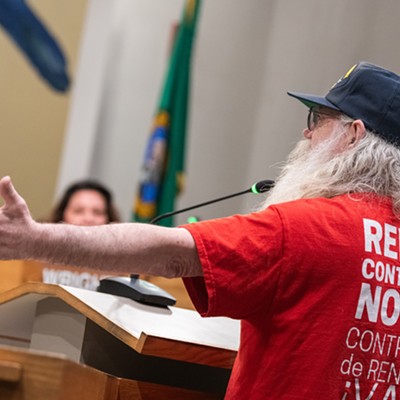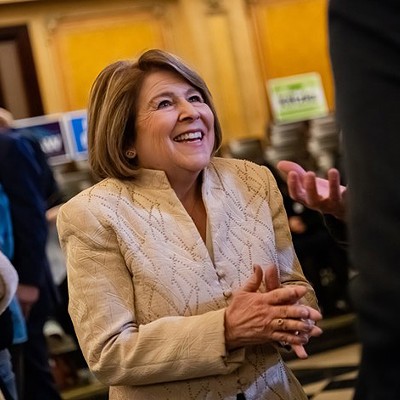When Washington lawmakers passed a compromise “education-first” operating budget last month, Republicans and Democrats alike touted the budget’s $1 billion spending increase for public schools. Rep. Ross Hunter, D-Medina, said House Dems were “satisfied that this budget makes good on our responsibility to fund the basic education expansion.”
“Each parent who cares about his or her child’s education should be happy,” lauded Sen. Don Benton, R-Vancouver.
Yet many education advocates weren’t thrilled with the budget. Superintendent of Public Instruction Randy Dorn complained the new budget didn’t spend enough to satisfy the state Supreme Court’s McCleary ruling to fully fund basic education in Washington, and questioned how the Legislature even planned to pay for it. Washington Education Association President Mary Lindquist said, by any measure, state lawmakers “have come up short.” At this rate, the WEA says it will be 30 years before the Legislature fulfills its constitutional obligation to amply fund education in the state.
“It is incredible that our elected officials are now closing the door on literally generations of Washington students,” Lindquist said.
The problem, according to Kim Justice, an analyst from the Washington Budget and Policy Center, is the state’s new spending plan doesn’t offer any long-term solutions toward making good on its promise to invest more money in education. The Legislature didn’t create any significant revenue streams, and economic growth alone won’t cut it.
“This just makes a small dent in meeting that goal,” she says. “[Lawmakers] are setting themselves up for a really big challenge for the next biennium because they didn’t do as much as they could have.”
Over the course of this year’s budget negotiations, spanning 153 days and two special sessions, legislators faced a twofold challenge: A projected $1 billion budget shortfall and a court order to fully fund basic education by 2018. In the 2012 McCleary case, the state Supreme Court ruled that Washington is failing its constitutional duty to amply fund basic education as defined by the Legislature in a sweeping education reform bill in 2009. To comply with the high court’s ruling, a legislative task force estimated that the government would need to pump $1.4 billion into public schools in the coming two years and $4.5 billion by 2017-19.
The new budget provides K-12 education with an additional $944 million in funding, but according to Justice, under the strictest definition of basic education, the Legislature only invests $800 million — substantially less than the task force recommendation.
But even that reduced number, WEA spokeswoman Linda Mullen notes, includes $320 million in savings by suspending a voter-approved initiative for cost-of-living pay adjustments for teachers. Public school employees will go six years without a state pay raise.
“It’s demoralizing for educators to have gone so long without even an adjustment on inflation,” Mullen says. “It’s simply a tax on school employees to fund other parts of the education budget.”
Sen. Andy Billig, D-Spokane, says this final budget compromise was the best-case scenario. The Republican majority coalition in the Senate wouldn’t budge on a House-approved tax proposal that would have raised about $900 million in revenue by eliminating or narrowing preferential tax rates and extending a tax hike on service businesses. In the final budget agreement, lawmakers closed an estate tax loophole and increased taxes on residential phone services, netting about $245 million in revenue.
“I think the question for the Legislature will be: Do we want to continue to patch together a budget and take tiny steps toward our constitutional duty of funding education, or do we want to fulfill our responsibility on the timeline that is laid out for us by the Supreme Court?” says Billig. “Doing so will require new revenue.”
But conservative reformers say more money is not necessarily going to improve education in Washington, where the average class size is larger than all but three states in the country. (The new budget only supplied funds to reduce class sizes in kindergarten and first grade in high-poverty schools.)
Paul Guppy, vice president for research at the Washington Policy Center, a free-market think tank based in Seattle, argues that because school districts, rather than individual principals, control the purse strings, education money isn’t spent effectively.
“Just adding money to an unreformed and largely dysfunctional education system is not going to help kids learn,” Guppy says. “The problem with public schools is that union seniority and collective bargaining agreements prevent principals from firing bad teachers.”
Sen. Michael Baumgartner, R-Spokane, questions whether the state can even afford to funnel more than $4 billion into the public school system despite the high court’s mandate. Doing so, he says, would require dramatic tax increases or substantial cuts to social services.
“The McCleary decision frankly received way too much hype,” says Baumgartner. “We need to, in my view, take a step back from McCleary and look at what’s the best way we can fund education in a way we can afford.”
In the meantime, parents like Mullen, the WEA spokeswoman, will continue to worry about large class sizes and whether her 5-year-old son in Seattle public schools will get the attention he needs from his teacher to be successful.
“He had 27 kids in his class. … It took him about half of the school year to settle down and understand the routine,” she says. “We won’t see the class sizes that we need. We won’t see the types of education support in schools we need. We won’t necessarily see the resources dedicated to make sure kids have what they need to learn.”



















